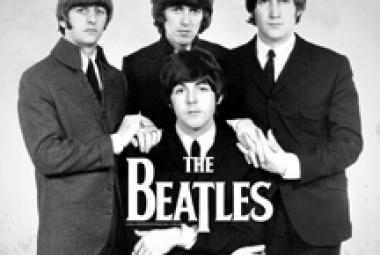After two flops, the Primitives were feeling the pressure and reacted the way that many young bands do when this happens: They broke up, but they then reformed around a new lead singer, MAL RYDER. Ryder was already established in the British scene to some extent, having released four singles, so the band was redubbed Mal and the Primitives. In this new incarnation, John E. Soul stayed on for awhile as rhythm guitarist, and Jay Roberts became the bass guitarist, though Ryder indicates that Roberts began using his birth name Jeffrey Farthing; they were joined by Stuart Linnell on lead guitar and Mick Charleton on drums.
Singer and band combinations like this were fairly common in this era; past UARB the Soul Agents backed Rod Stewart during the first half of 1965 for instance. The backing band for the major English rock star Cliff Richard for many years was one of Britain’s top instrumental rock bands, the Shadows.
Billy J. Kramer with the Dakotas had numerous hit songs, including several Lennon/McCartney songs in Britain (Billy J. Kramer was also managed by Brian Epstein) and a major U.S. hit, “Little Children” in March 1964. They used “with” rather than “and” so as to keep separate identities for the singer and the band. The Dakotas by themselves had a hit instrumental in the U.K. with “The Cruel Sea”; for its U.S. release, it was retitled “The Cruel Surf” and was later covered by the Ventures. A curious song by the Dakotas called “7 Pounds of Potatoes” – “ . . . come between me and my love”, according to the lyrics – is included on English Freakbeat, Volume 2 (both the LP and the CD).
* * *
Here is the sum total of what Wikipedia has to say about Mal Ryder: “Mal Ryder (real name Paul Bradley Couling) (born 27 February 1944 in Llanfrechfa, Wales) is a British singer who became quite popular in Italy in the late 1960’s, singing with Mal and the Primitives.” Italian Wikipedia though has sizable articles on the Primitives and also Mal (though surprisingly, there is not even a redirect from Mal Ryder).
As told on Mal Ryder’s website, www.mal.it, he first began playing with an Oxford band called the Meteors, but he jumped ship when asked to become the lead singer for a better local band, the Spirits (formerly known as the Beatniks). At that point, he began using his stage name, and the band became Mal Ryder and the Spirits.
This group made three singles from 1963 to 1965; a fourth single came out in Mal Ryder’s name individually. The first two 45’s, “Cry Baby” b/w “Take Over”, and the Bobby Goldsboro song “See the Funny Little Clown” b/w “Slow Down” were both produced by Peter Sullivan, who was also Tom Jones’ producer in that time period. The song that Greg Shaw thought was the strongest of these songs, “Forget It” (from November 1964) is included on two CD’s that I have, English Freakbeat, Volume 1 and English Freakbeat, Volume 4. As far as I am concerned, this bouncy R&B song with gruff, throaty vocals stacks up well with all of the Primitives material that I have heard.
* * *
Mal and the Primitives released just one single in Great Britain; “Every Minute of Every Day” b/w “Pretty Little Face” (the latter song written by bandmember John E. Soul) came out on Pye Records and also made no impact on the charts, like the earlier Primitives singles. About their final U.K. single, Bruce Eder has this praise: “They had a sound similar to the original group, although [Mal] Ryder was more of a dramatic singer, with an intense but less raspy delivery, more along the lines of a pop-soul vocalist like Chris Farlowe in his later 1960’s incarnation. ‘Every Minute [of Every Day]’ was a suitable A-side, similar to the group’s past work, while ‘Pretty Little Face’ was a lot more elegant than anything the original group had ever done, right down to the rather lyrical acoustic lead guitar doubling the opening piano part, similar to what the guitars on Bill Wyman’s ‘In Another Land’ [by the Rolling Stones] do on the middle and final verse of that song.”
In January 1966, they did a brief tour of Norway; as Mal Ryder tells it: “It seemed as though they hadn’t seen anything like us before; we felt like the Beatles.”
* * *
With their experience in Norway fresh on their minds, Mal and the Primitives decided to become one of several expatriate British rock bands that began to appear elsewhere in Europe by the mid-1960’s. The Downliners Sect and Alexis Korner followed a similar route. Perhaps the best known is the Sorrows; unable to follow up their 1965 hit “Take a Heart” in their home country (also included on Nuggets II), the group relocated to Italy in 1966 and recorded a highly esteemed Italian album in 1968, Old Songs New Songs. I have the first official reissue of Old Songs New Songs in 2009 on Wooden Hill Records; a second CD includes an early demo of the album plus a concert performance from 1980. A full cover by the Sorrows of the early Bee Gees hit “New York Mining Disaster 1941” is included on this early demo; only a single line from “New York Mining Disaster 1941” made it onto their album.
(May 2015)















